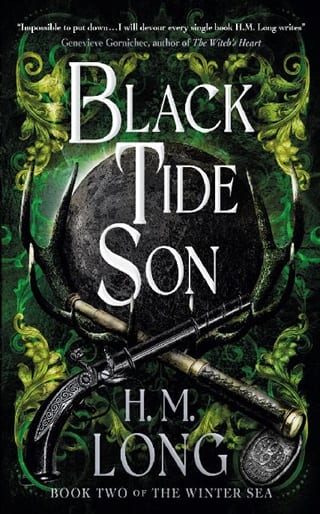Fourteen The Monastery
FOURTEEN
The Monastery
SAMUEL
T he next day, we reached the western edge of a long peninsula that punched north from the Mereish mainland into the sea, its tip surpassing even the latitude of the Aeadine Anchorage. It was appropriately forbidding, rocky and rimed with snow and ice. The few settlements we saw seemed nearly abandoned, and there were no smaller watercraft to be seen.
I sensed Fort Gat before I saw it, a prickle of premonition that drew my gaze out and up. I called for a spyglass.
The fort sat on an outcropping high above the sea, the heights and lines of its silhouette made all the more ominous by a haze of fine snow blowing out over the tops of the surrounding cliffs. Below it, curving around to the south, lay the port town of Maase. Lights and smoke signaled an active population, but we did not intend to go anywhere near the town, or the fort, until the night of our foray.
The ship changed course under Olsa's supervision, cutting off my view behind a shoulder of coastline.
We anchored in an inlet the pirates of Orres had directed us to. It was nearly inaccessible by land, surrounded by high cliffs and sheltered from the wind. The only path out of the anchorage was a meandering, ice-laden stairway laid hundreds of years before by the monks who inhabited a nearby monastery. Thankfully for us, it had fallen out of use—likely due to the inherent danger of the climb and probable bone-cracking fall.
"Every monastery has a Cleric—a healer-mage, as you call them," Sa Vis had assured us before our departure. Mary had wisely kept the true reason for our seeking a mage quiet, and Willoughby's fever—now spread among the crew—provided a timely excuse. "They are bound to discretion. They will help your crew, no matter who you are."
That was good news, considering a quarter of Hart' s complement were ill and my headaches had not eased, despite the fact that tomorrow night we intended to make our play against the fortress. Still, I kept my hopes guarded. Finding a cure for Ben and I would be nothing short of a miracle. But if all I found was a cure for my crew and my own headache? I would appreciate that too.
The monastery was tucked into the hills east of the inlet. The tall, round tower, square of lodgings, and high-roofed chapel were nestled into a spiderweb of stone fences, where sheep and goats nosed beneath the snow. Garden upon garden slept underneath a blanket of white, marked by the drooping heads of dead sunflowers, the outlines of raised gardening beds, and various lattices laden with last summer's vines. Here and there monks wandered, clad in dark robes against the pale snow, and smoke rose from the chimneys of far-flung hovels in the hills.
As I strode up the long road, coat over one shoulder and steam rising from my sweating back, I reflected that the landscape looked not unlike Aeadine's midlands, where I had spent my earlier years. But those hills were rawer, nearly mountains, and in the winter the snow would make the roads impassible. These hills were gentler, more forgiving, and the sheep who eyed me through wooden gates were a soft lowland variety rather than Aeadine's rugged, crag-hopping goats.
I passed two monks on the road leading a donkey with a laden cart of hay. They both nodded but did not speak, so I did the same. The next monk I met, though, at the open gate to the monastery proper, more than made up for their silence.
"Greetings, traveler," the old man said in Mereish, eyeing me from head to foot. He had a bloody hatchet in one hand and a headless duck in the other. A trail of blood led back across the snow and behind an outbuilding, blurred by the stumbling prints of small, webbed feet and fallen feathers.
"Hello," I said in practiced, Usti-accented Mereish.
Noticing the direction of my gaze, the man held up the limp duck and said with chagrin, "Poor soul did not realize he was already dead. How may I help you?"
As unexpected as the sight of a black-robed monk with a bloody hatchet was, I returned to my purpose. "I was hoping to visit a healer."
The monk shifted the hatchet and fowl into one hand and gestured with the other towards the main, square building. "Come with me."
I fell into step, noting the occasional drip of blood from the duck. The man's willingness to help and lack of suspicion left me feeling oddly guilty, though I intended the monastery no harm. I had not even lied about my identity—the monk had not asked my name, or where I had come from, or why an Usti stranger was wandering their desolate coast.
This seemed to be a standard practice, for when the monk knocked at a tall door with a pointed top, another monk, a woman, opened it and asked nothing but, "What do you need?" as she led me into a long, quiet ward lined with clean, empty beds. The air smelled of soap and herbs—slightly thick, though not unpleasant.
This second monk, who had a youthful look to her round, dark-skinned face, gestured for me to sit across from her at a table at one end of the ward. Still mildly shocked at being admitted so freely, I took the proffered seat.
"What ails you? Or do you come on behalf of someone else?" the monk asked. Her voice was light and had a lilt, differing from the common Mereish accents I was accustomed to.
I took a moment to collect myself. A weight lingered on my shoulders—a weight of portent and promise. I had come so far to reach this moment.
"I have two questions. The first concerns an illness many people under my care have taken."
I went on to describe the symptoms. Halfway through, the monk began to nod, and, by the end, she had begun to move about her office, gathering pouches and tinctures and asking questions.
"It is a mild imbalance," the monk said. "Very common in the spring, and anyone on this coast grows immune before adulthood— meaning adult instances are rare, and they look much different than they do in children. I cannot heal it, but these will manage the symptoms until the imbalance rights itself."
"Thank you," I said sincerely, and prayed headaches would be the first symptom to go.
"What is your second question?"
"It regards magecraft," I began, hesitated, and rephrased, remembering to keep my accent in place. "Corrupted magecraft. My brother and I were amplified as children, and I am searching for a cure."
The monk was quiet for a long moment, well past the point of discomfort. I watched her anxiously, swallowing down the age-old instinct that berated me to be silent, to deny.
"I am a Sooth," I continued. "My twin brother is a Magni. I am… unrooted, in the human world, and frequently slip into the Other, even becoming trapped there. My visions rarely come at will, and I have little control over them. I have learned to manage my condition to some extent, though I have no idea how long that will last. My brother continues to become more and more corrupted. But I once met a Mereish man who told me there may be a cure for us here."
As I spoke the monk began to slowly nod, her gaze heavy and grave. "A cure in Mere?"
I nodded, trying to quell a flutter of anxiety. Had the talisman maker been wrong?
The monk frowned thoughtfully. "I cannot heal mages. The brothers and sisters at the Oruse, however, might."
"Where is that?" I asked.
"A shrine, a little over two days southeast, four on foot." As the monk spoke she leaned back in her chair, lacing her fingers over her stomach, her expression preoccupied. "They have a High Cleric, more powerful than I."
"Is there something else?" I asked. I sensed there was something she was not saying, a warning withheld.
"Their Saint is kind to those outside their order," the woman said, waving the issue aside. "It is a place of refuge for all, even foreigners. Simply be respectful, if you go. Who in Usti would have amplified you? Your queen outlawed the practice many years ago."
"Immigrants from Aeadine did it," I said, using the lie I had prepared. But though my lips moved, my mind was mired in the conclusion that this Oruse was too far away. After rescuing Benedict, we would need to flee quickly.
The monk blew out an angry breath. "The Aeadine. Their monarchs deny the truths of magecraft, and their common folk distort it. Such willful ignorance."
I might have taken offense, but the woman hinted at something I had long suspected.
"Their monarchy knows and denies the truth?" I asked, leaning forward. "I assumed they must suspect, they cannot be wholly ignorant…"
"Of course they know." The monk laughed, but it was not a belittling laugh, just the laugh of a jaded, world-weary sympathetic. "But those with power must keep it, and your Saint endorsed only three branches of magecraft—the Stormsingers, the Magni, and the Sooth. Now, I am sorry I cannot help you more, traveler. But if you can, go to Oruse."
I left the monastery with a satchel full of cures and a heart like lead. Tomorrow, we would make for the prison. Tomorrow, we would try to rescue my brother.
But was he worth saving if he would forever remain a monster?
 Fullepub
Fullepub 



